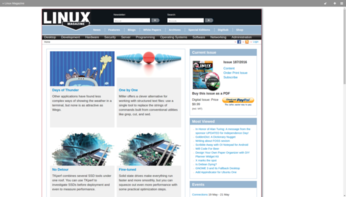Min: Bare-Bones Browser with Built-in Ad Blocking

Productivity Sauce
At first glance, Min may seem like a browser that is too minimalistic to be of any practical use. But behind its bare-bones facade lurks several handy features that make it a viable lightweight alternative to mainstream browsers like Mozilla Firefox and Chromium. For starters, Min supports tabs and you can perform searches by entering search queries directly into the address bar. In addition to regular search queries, the DuckDuckGo search engine that powers Min allows you to search Wikipedia articles and programming documentation as well as perform fuzzy searches and use the address bar as a simple calculator. As you would expect, Min features bookmarking functionality, and the browser also supports reading mode that reformats articles for a better reading experience. There is also the focus mode that hides all tabs except the current one.
Min's main attraction, though, is its built-in ad and tracker blocking functionality (it's disabled by default, so you need to enable it manually). Add to this the fact that Min is lightning fast, and you have a rather compelling alternative to established browsers. There is a tiny fly in the ointment, though: Min doesn't offer a lot in terms of customization. It's not possible to change the default search engine, so you are stuck with DuckDuckGo. And if you want to enable ads on individual websites to support your favorite publications, you are out of luck, as with Min's adblocker it's all or nothing.
comments powered by DisqusSubscribe to our Linux Newsletters
Find Linux and Open Source Jobs
Subscribe to our ADMIN Newsletters
Support Our Work
Linux Magazine content is made possible with support from readers like you. Please consider contributing when you’ve found an article to be beneficial.

News
-
New Linux Botnet Discovered
The SSHStalker botnet uses IRC C2 to control systems via legacy Linux kernel exploits.
-
The Next Linux Kernel Turns 7.0
Linus Torvalds has announced that after Linux kernel 6.19, we'll finally reach the 7.0 iteration stage.
-
Linux From Scratch Drops SysVinit Support
LFS will no longer support SysVinit.
-
LibreOffice 26.2 Now Available
With new features, improvements, and bug fixes, LibreOffice 26.2 delivers a modern, polished office suite without compromise.
-
Linux Kernel Project Releases Project Continuity Document
What happens to Linux when there's no Linus? It's a question many of us have asked over the years, and it seems it's also on the minds of the Linux kernel project.
-
Mecha Systems Introduces Linux Handheld
Mecha Systems has revealed its Mecha Comet, a new handheld computer powered by – you guessed it – Linux.
-
MX Linux 25.1 Features Dual Init System ISO
The latest release of MX Linux caters to lovers of two different init systems and even offers instructions on how to transition.
-
Photoshop on Linux?
A developer has patched Wine so that it'll run specific versions of Photoshop that depend on Adobe Creative Cloud.
-
Linux Mint 22.3 Now Available with New Tools
Linux Mint 22.3 has been released with a pair of new tools for system admins and some pretty cool new features.
-
New Linux Malware Targets Cloud-Based Linux Installations
VoidLink, a new Linux malware, should be of real concern because of its stealth and customization.

